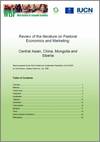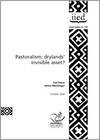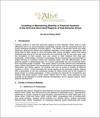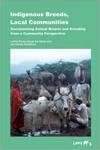Mobile pastoralism is the most sustainable way to manage the World’s rangelands, and alternative land-uses come at an environmental and an economic cost. The magnitude of those costs is not properly understood, and they may well be incurred with many people not noticing. If countries that possess significant rangelands desire to reverse desertification and overcome poverty, then it is crucial that they recognise the environmental logic of mobile pastoralism and its great economic potential.
Year of publication: 2007Organization: الاتحاد الدولي لحفظ الطبيعة
Topic: اقتصاد
Language: 中文, English, Français, Español
Type of document: السياسات والتشريعات
Geographical coverage: مناطق العالم
This review of the literature on pastoralist economics is a contribution to the global learning on the importance of mobile pastoralism as a form of productive and sustainable land management. The review is intended to highlight existing knowledge on the value of pastoralism, the gaps in this knowledge, trends in pastoral economies and policy options that can support drylands economies most effectively.
Year of publication: 2006Organization: الاتحاد الدولي لحفظ الطبيعة
Topic: اقتصاد
Language: English, Français, Español
Type of document: تقني
Geographical coverage: مناطق العالم
Eight regional studies were carried out in the context of the Global review of the economics of pastoralism. The studies identify how pastoralism contributes to domestic and global markets in different regions. The studies capture the following regions: Horn of Africa and Southern Africa; West Africa; Eastern Africa; Northern Africa; South America; Asia; Middle East; and Europe.
Year of publication: 2006Organization: الاتحاد الدولي لحفظ الطبيعة
Topic: اقتصاد
Language: English
Type of document: تقني
Geographical coverage: أمريكا الشمالية, أمريكا اللاتينية, أوروبا, الشرق الاوسط, شمال أفريقيا, غربية افريقيا, أفريقيا الوسطى, شرق أفريقيا, جنوب أفريقيا, آسيا الوسطى, جنوب آسيا
Many policy makers in East Africa have preconceptions about the value of pastoralism as a land-use system believing it to be economically inefficient and environmentally destructive. Yet, this is not evidence-based. Not only is there no consensus on what is a dynamic economic model of pastoralism, no mechanisms exist to inform government decision-making of its comparative advantages over alternative land uses. A new conceptual framework is needed to assess the value of pastoralism that goes beyond conventional economic criteria in order to provide fresh insights to its contribution to poverty reduction, sustainable environmental management and the economic development of dryland areas of East Africa in the context of increasing climate uncertainty. This paper proposes such a framework.
Year of publication: 2006Organization: المعهد الدولى للبيئة والتنمية
Topic: اقتصاد, القيمة المضافة
Language: English, Français
Type of document: تقني
Geographical coverage: شرق أفريقيا
This paper seeks to provide national and international policy-makers interested in the development of arid and semi-arid areas with background information and policy options, on whether and how to invest in mobility of pastoral systems in Africa. It first describes the trends leading to declining mobility, followed by a description of the key underlying causes for these trends and their impacts on mobile pastoralists. It then provides the rationale for investments and concludes with policy options which policy-makers face when deciding on priorities to be allocated to overall pastoral development, and to specific actions within pastoral development.
Year of publication: 2006Organization: منظمة الأغذية والزراعة للأمم المتحدة
Topic: اقتصاد, القيمة المضافة
Language: English
Type of document: تقني
Geographical coverage: غربية افريقيا, أفريقيا الوسطى, شرق أفريقيا, جنوب أفريقيا
This toolkit gathers together information on 10 tools that have been successfully used by members of the International Land Coalition (ILC) to promote, protect, and strengthen the land rights of Indigenous Peoples and local communities. It is intended to facilitate mutual learning based on the good practices of specific ILC members. The opportunity to share knowledge is one of the main benefits of being part of a network like the ILC. Use these tools, adapt them to your specific context, share them with your partner organisations, and share with us your achievements and successes!
Year of publication: 2005Organization: الائتلاف الدولي للأراضي
Topic: صراع, الخدمات البيئية, الشعوب الأصلية, نوع الملكية, مشاركة
Language: English
Type of document: تقني
Geographical coverage: مناطق العالم
The collection of research presented in this brief explores the roles of collective action and property rights in influencing incentives for rangeland management. The underlying premise is that collective action and property rights are important for the sustainable management of rangelands, watersheds and for technological innovation and adoption. Investments in rangelands restoration requires that individuals and groups are assured of long-term security to the use of the resource, and the necessary authority to protect their restored rangeland. At the same time, research presented here also highlights the role of both external and internal factors in influencing the evolution of property rights and the collective capacities of groups to manage natural resources within the context of environmental variability. Both dimensions of research provide a deeper reflection on how policies can be crafted to enhance rural livelihoods while sustaining the rangeland resource base.
Year of publication: 2005Organization: الجماعة الاستشارية للبحوث الزراعية الدولية
Topic: اقتصاد, أمن غذائي, الشعوب الأصلية, نوع الملكية
Language: English
Type of document: تقني
Geographical coverage: غربية افريقيا, شرق أفريقيا, مناطق العالم
This book was inspired by our interaction with the Raika, the traditional livestock breeders of Rajasthan. From them we learned about the relationships between humans, animals and the environment that shape livestock genetic resources and generate indigenous breeds. This publication provides a welcome opportunity to redress some of the common misperceptions about indigenous livestock breeders. It describes the threats to these breeds of livestock and how to document them as a first step in conserving them in collaboration with the communities where they evolved.
Year of publication: 2005Organization: ,
Topic: الخدمات البيئية, الإدراك الفطري, مشاركة
Language: English
Type of document: تقني
Geographical coverage: جنوب آسيا








